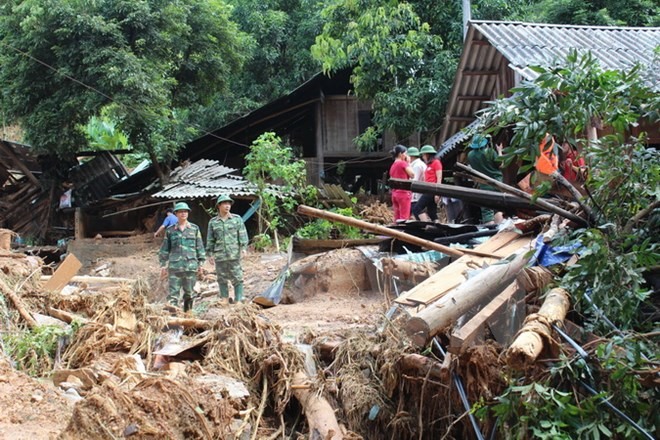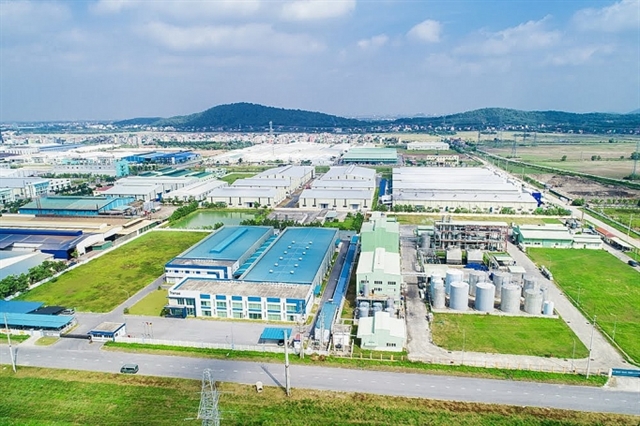 Society
Society

In the context of increasing instances of extreme weather, Viet Nam has to significantly improve its forecasting capabilities, Deputy Prime Minister Trịnh Đình Dũng said yesterday.
 |
| In the context of increasing instances of extreme weather, Viet Nam has to significantly improve its forecasting capabilities, Deputy Prime Minister Trịnh Đình Dũng said yesterday. – VNA/VNS Photo Nhan Sinh |
HÀ NỘI – In the context of increasing instances of extreme weather, Viet Nam has to significantly improve its forecasting capabilities, Deputy Prime Minister Trịnh Đình Dũng said yesterday.
Speaking at a conference held in Hà Nội to mark the the International Day for Disaster Reduction, he specified that meteorologists in the country were not able to provide disaster warnings early enough, especially for specific areas.
At the conference titled “Integrated Disaster Risk Management and Strengthening Resilience to Climate Change in Việt Nam," participants discussed policy options to mitigate the impact of disasters, improving institutional capacity and finding financing solutions.
Việt Nam has, step by step, improved its coping capacity, in evacuating people from vulnerable areas, building flooding-proof housing, investing in transportation systems, and shifting production models to adapt to climate change, the Deputy PM said.
“It is important to raise the awareness on natural disasters and promote the role of people and local forces, especially those living in flood prone areas,” he said.
Nguyễn Xuân Cường, Minister of Agriculture and Rural Development and Chairman of its Central Committee for Disaster Prevention and Control (CCDPC), said that the more economic activities developed, the greater the risk of natural disasters, especially in countries where there was a lack of uniformity in many aspects.
“Thus, disaster prevention and control is a key task that is given top priority by the Government. It is also an important factor in deciding the scale and speed of growth, as well as poverty reduction.”
The Agriculture Minister stressed that it was essential to continue developing essential infrastructure and apply scientific and technological advances in forecasting and managing natural disasters.
Natural disaster prevention and control should also be integrated into socio-economic development plans at all levels, branches and localities, he said.
Other participants noted that Viet Nam was highly prone to natural disasters, with over 70 percent of the population exposed to risks from natural hazards.
Over the past two decades, natural disasters have taken more than 13,000 lives and caused property damage in excess of US$6.4 billion.
Economic loss from natural disasters is estimated at 1-1.5 per cent of the GDP. The agriculture sector has been hardest hit by most natural disasters.
“Việt Nam is the seventh most disaster-prone country in the world, with drought, severe storms and flooding causing substantial economic and human losses,” said Achim Fock, acting Country Director for the World Bank in Việt Nam.
“The Vietnamese Government has made considerable efforts to respond to climate disaster risks. Natural disasters can undo decades of development and the costs of rebuilding can be more than the costs of investment in disaster resilience,” he added.
Experts at the conference agreed that Việt Nam could mitigate risks by implementing an integrated disaster risk management strategy.
They said Việt Nam faced several key challenges in disaster risk management, including institutional fragmentation, ineffective processes for sectoral planning, and the absence of a cost-effective strategy for financial protection.
In the event of a major disaster, losses could exceed 4 percent of GDP, they said, adding that climate change was expected to increase the impact of disasters, with higher frequency, severity and intensity.
Conference participants discussed several options to address the challenges, including clarifying and consolidating disaster risk management responsibilities across agencies and establishing robust disaster preparedness and response systems.
Global best practices show that effective planning and implementation begin with the right policies, according to participants.
The 2017 International Day for Disaster Reduction has the slogan: “Safe home: reduce risk and evacuate when disaster strikes.”
Yesterday’s conference was jointly organised by the Ministry of Agriculture and Rural Development’s Central Committee for Disaster Prevention and Control (CCDPC), and the World Bank. – VNS




